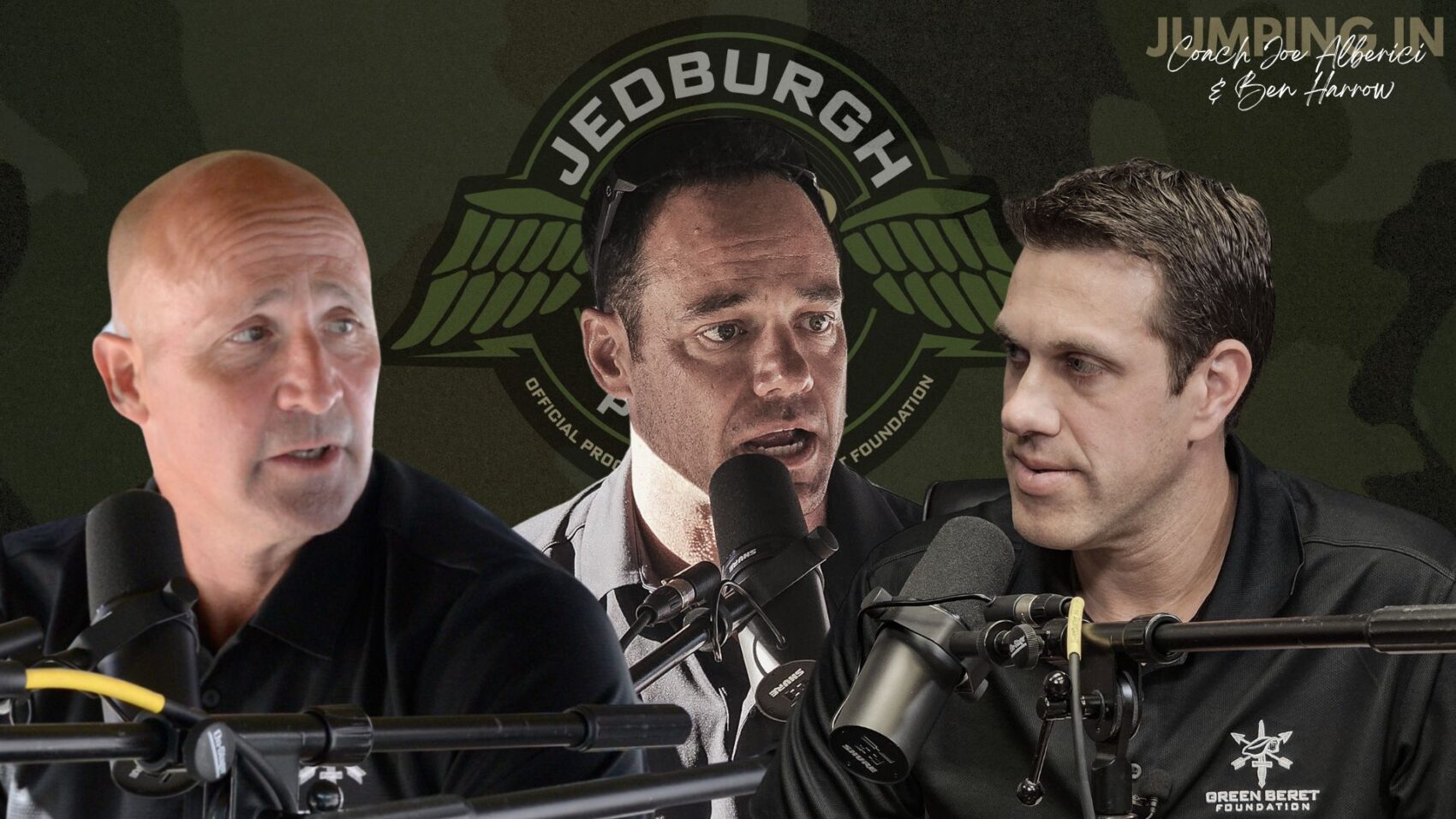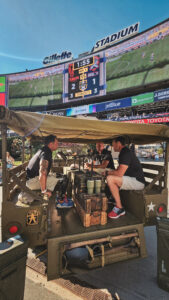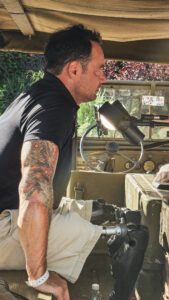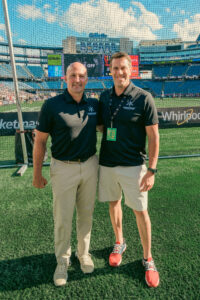

Toughness defines Special Operations and the sport of lacrosse. Toughness requires a person to deal with hardship, overcome difficult situations, persevere through mental and physical challenges. Toughness is one part natural, one part learned, and one part the result of consistency. To excel as a Green Beret, Navy SEAL or a lacrosse athlete, you better be tough.
Joe Alberici and Ben Harrow are two tough men. Joe is the head coach of Men’s lacrosse at West Point, and Ben is a West Point lacrosse alumni, Green Beret and double leg amputee.
Coach and Ben joined Fran Racioppi to recap the Stars and Stripes Classic, what it meant for our Green Berets and Navy SEALs to face off on the lacrosse field, how to build teams based on being tough, and what it takes to win no matter the challenge; whether that’s on the playing field, the battlefield or the boardroom.
Take a listen, watch, or read our conversation, then head over to our YouTube channel or your favorite podcast platform to catch all the action from the Stars and Stripes Classic.
Don’t forget to go to Green Beret Foundation to join our 18 Series Match Challenge to support our team as the Snakeeaters took on the Frogmen.
—
Coach A, the Stars and Stripes Classic just ended. We’re sitting here in the end zone at Gillette Stadium. You had the opportunity to coach the game and develop these guys over the last couple of days. Not necessarily the result on the scoreboard we were looking for as the Green Beret Foundation, but a win all around for a lot of different reasons. What are your thoughts?
Just the opportunity to work with these guys, the word that comes to mind is elite. A lot of these guys haven’t played a lot of lacrosse. They’re doing a hell of a lot more important stuff, which I am appreciative of for myself and my family, but the competitiveness, down 6-1, the way the guys scrapped back, I felt like they really took it to them throughout, and we just came up a little bit short in the end. I thought they wore the jersey, and honored the jersey in the right way, as one would expect.
They were down 6-1, and we weren’t worried. Honestly, we weren’t worried about it. We said, “Hey, look, these guys aren’t going to be like this. They’re going to get it together.” What did you think? You had a chance, as I said, over the last couple of days to really work with them. We checked in with you. There wasn’t a whole lot of scheming. It was a physical game, but when you look at the defense’s ability to get out there and play as a unit, and the offense’s ability to just get out there and put some plays together, how would you break it down?
I thought really the game started to change in the second quarter, about midway through. What I had said to them in the huddle, down 4-1, down 5-1, I just said, “Listen, this is not indicative of, this score is not indicative of what’s going on.” What I’m looking at athletically, what I’m looking at in terms of skills, it didn’t seem to be like a 5-1, 6-1 game. We gave up a two-pointer, and then they responded. End of the second quarter, two more goals, go in down 6-3, get the first one coming out of the half, and win the third quarter 7-6. What we were struggling with a little bit at that point was clearing the ball, and maybe playing a little bit too much defense at that point.
I want to tip my hat to the defensive guys, our goaltending, exceptional. Skyes, a few of those guys I coached back at West Point a long time ago, it didn’t look like they missed too much of a step, to be truthful. They were as tough and as tenacious as I remember when I was coaching them. Really proud of them, really proud of the whole team. Again, 6-1, probably. Nobody blinks an eye if you wave the white flag at that point, but that’s just not in the DNA here.
The guys just kept battling, and, again, had our opportunities towards the end and just fell a little short. The clock got a little short on us. I’m not sure we lost it, I think just the time ran out.
What an amazing first execution of this game. The Green Beret Foundation, the SEALs, the PLL, it just gave everyone involved such an incredible experience, and I’m grateful to have been a part of number one.
I want to talk about toughness. You talk about toughness a lot, and while you were talking here and breaking down the game, we witnessed a feat of toughness. So if you’re, if anyone is listening to this on the podcast platforms, go to the YouTube platform so they can watch as Ben Harrow lifted himself up, upper body strength. For those who don’t know Ben, he lost both of his legs in an IED strike in Afghanistan, and also a West Point lacrosse player, knows you well. Toughness that is learned on the field of lacrosse permeates through your body and your character in anything that you do.
Let me tell you my story about Ben Harrow, I competed against him. I was an assistant coach at Duke University, and we played him a couple of times, and just an absolute warrior out there. Short stick D-middie, toughest spot, toughest thing to play, and then we got reconnected at Walter Reed, and I don’t know exactly how long Ben had been there at that point, but I had later become the head coach, and I wanted to go down and see him. I went down there, and the absolute look in his eye was like, “Let me tell you what I’m doing,” and I’m like, left no doubt. Like what you saw right there was like, it’s just everything that he said at that moment coming to fruition. The guy is an absolute animal, an amazing husband, and father, and has really got himself with a business acumen, and he’s just serving in other ways. It’s just an inspiration to me, an inspiration to the Army Lacrosse family, and an inspiration to the Green Beret.
That’s it, mic drop. Why is toughness so important, though, and why do you have to teach it at an early level?
There are a lot of other people in the whole hell of a lot tougher than me, and I’m sitting here talking toughness to a Green Beret, and I’m the softest guy in the place. It’s more along the lines of how I define it, do what you have to do when you have to do it as well as you can do it, that’s toughness, and doing it every time. I’m not a big fan of 110%, I don’t believe in that. Toughness is when you’re 100% of the time, and doing that in less-than-ideal situations.
Toughness is doing what you have to do when you have to do it as well as you can do it every time.
I think toughness is always equated around physical toughness, and certainly, there’s an element to it, but the mental toughness, the toughness that you have to show to have the courage to step outside yourself and see other people, that’s tough. It’s so easy to turn inward and think about who you are, what you got to do, and what you’re going to get out of this situation.
When you look at a Green Beret, that’s not what they’re doing. Those guys were, throughout four days, and anyone I’ve ever met, grateful for everything, entitled to nothing. These are guys that, for what they’ve done for our country, should be entitled to a lot, and that’s just not how they look at it. That’s toughness. They think outside of themselves, they think about what job needs to be done that others aren’t capable of or others choose not to do. Either way, it’s not really a matter, but they see it, and they’re willing to step up and do it.
Last night, I talked about toughness. As tough as these guys are, the families are the tougher ones to me. That’s what I think of toughness, and if you look, you can see the hair on my arm sticking up. As a child, or as a wife or girlfriend, to allow your significant person, the most significant person in your life, to go do something for others, and not b*tch and whine about it, just say, “Hey, here are the people at home, I got to take care of it.”
The leaders in that group, how they take care of other soldiers and their families, as hard as what those guys are doing, I would tell you it is infinitely tougher doing what they do, because they don’t know what’s happening and what’s going on out there, and they’re not, often they’re left in the dark about it because they have to be. But yet, to have that sort of toughness to take care of the things that need to be taken care of back home, that’s toughness. There are a lot of ways to define it. Maybe one thing that I’ve brought to that part of toughness is getting it outside of the physical and trying to bring to light for young kids what toughness really looks like, and in the different forms real toughness takes place.
The shirt that I got from Coach A, one of the times I was back up at school talking to the team, whether he came down to see me at the hospital, I still have it. It’s not weathered and old, but it’s one of those shirts I’ll never get rid of. It says West Point Orbit Lacrosse, but on the back, it says “Family, Toughness, Tradition,” and it was those three principles that I think Coach A had brought to the team, that us as alumni have loved to see over the past almost twenty years, and you’ve been the head coach and really instilled in the program, and I think that’s part of the reason why we’ve always been a competitive team, but we’re a really competitive team, and we’re all just waiting around, like, this is going to be it, this is the year we’re going to go to the Final Four, and we’re knocking on that door.
The school year started, so after this, you’re going to get sucked back up into West Point, and your vacation’s going to be over. You’re going to get back at it because the season is going to start your off-season activities, and then get ready for the spring. But you’re right that the Army program has come a long way, and when we think about great lacrosse teams and great lacrosse programs out there, I didn’t go to West Point, but I’m honored as a Green Beret and as an Army veteran to say that our West Point team is up there competing at the elite level. Talk about the preparation that’s going into this season.
The habits that we’re developing are just lagging measures of the success we’re going to have in the springtime. So, our guys on Friday morning, I came up here to Boston on Thursday, Friday morning, 5:30 AM lift, and then there’s a dozen of them that took aside Coach Lewis, our assistant coach, asked him to do shooting, so they’re scoring, and then they’re going to go down and take calculus, and then they’re going to head to boxing class, and then it’s physics.
Nobody on the outside feels sorry for our guys because they have to do all of those other things, so I don’t feel sorry for them either. And that’s what makes them special, their desire to be special, and the fact that they have chosen to do the extra stuff, and that is sharpening them and making them soon-to-be elite people, elite men that are going to serve our country in some capacity.
It has been a strong culture throughout. Guys absolutely love to see the Ben Harrows and his classmates, and the guys who have come before him. The greatest way to honor the tradition is to try and build a puddle, and they know the men that came before them. It’s when they come see us, our guys are locked in. I don’t know, were you out at our practice on Saturday?
The greatest way to honor the tradition is to try and build a puddle.
Sunday.
There were 30 guys that were up here on leave, and they all came to this Green Beret practice, and I didn’t ask them to. I told them what time the practice was, and I changed practice around a little bit, just to get a little bit later, 10:00 AM. But those guys, they’ve got limited time away, could have been anywhere, but just who they look up to, and they wanted to be around it. It was probably, for me personally, the coolest part of the whole weekend, to watch my current players mingle with some of my former players, former West Point guys, and just Green Beret, and they were on the field for 45 minutes afterwards, just changing, exchanging conversation. It really was the coolest part of the weekend for me, to see those worlds meshing.
You had called me, and I missed your call because I was grabbing a ride with Fran, but I was so pissed because I wanted you to go have lunch with some of the guys from the team this year, just to sit down and chat with them.
They’re awesome guys, and they’re trying to carry on what Ben and all the guys that came before them did. It’s just elite. I’d put it this way, good to very good to excellent lacrosse players, but elite human beings, and that’s really my message to our guys. That’s what we aspire to because if you can be an elite human being, you’ll probably be a pretty darn good Army lacrosse player. If you just aspire to be a great lacrosse player, that’s not necessarily going to make you an elite human being. I try to take that little holistic approach at West Point. We’ve got our own words and terms for it, but I think it falls really in line with West Point and what West Point stands for. I think it really is in lockstep with the Army, the greater Army, and what they want and what they want in their leaders.
You talked about the extra work, and I often think, as it’s getting tied up behind us, we’ve got the chaos playing the Cannons in the first game for the quarterfinals here.
That’s all bullsh*t, they’re just cheering for Benny Harrell.
That’s right, that was for you. They witnessed what you did.
As a cheer for Ben.
We’re sitting right here by the Bud Light booth over here, where they’re all slamming them behind us. But it’s that extra work, like we’re sitting here in Gillette Stadium, there are six banners hanging up there, and everybody thinks that those six banners were earned in the time that the coach had them on the practice field behind the stadium, when in reality, those six banners were earned in the off time.
When the players were not on the coach’s time, when they had to go do those other things. Ben, what you’ve gone through and how you’ve come back didn’t happen because the doctors sat there and said, “Here’s what you have to do, Ben.” It happened because you had a different vision for yourself. Not completely. I had my own vision in mind of what success was, right? When I played lacrosse, I knew where I wanted to be. I knew I wanted to go to West Point; I didn’t apply to any other schools. I knew I wanted to play Division I lacrosse, and that’s where I was going to go, and I ended up going there.
I was an all-state attackman in high school. Little did I know that Coach Emmer was going to make me a middie, and then eventually a defensive middie. But I was starting, playing D1 lacrosse, and making an impact, and to me, that was the most important thing, going out there and making an impact, and being a guy that you had to watch out for. Like, “That’s my ground ball. I’m going to fight you to the death for that ground ball.” And I took that same attitude with my rehab and recovery. I’m not just going to lie here and have rehab dictated to me; I’m going to figure this out, and I’m going to get myself up and walking again.
The game’s over, what’d you tell the team after this game?
I want to be careful with these guys and make sure like, hey listen, I’m not giving you an attaboy. Nobody came here to come in second. But I didn’t want to take that approach fully because I wanted to recognize that these guys wanted to win, and they played to win. I was just really proud of them, and I was thankful for the opportunity to work with them. I was thankful for their attitude, their coachability throughout, all the things that make them great soldiers.
The fact that they’re selfless, that they’ll do whatever it takes to be a little better. Like when I was telling them, we were a little short on some short-stick DMs, and I’m hitting guys up right before the game, like, “Make sure you’ve got a short stick that you can throw with, might have to get you in there.” “Coach, whatever you need.” Like, I didn’t even get the whole sentence out. “Whatever you need, Coach. Do whatever you want.”
I was just appreciative of that. I was appreciative of their response when we were down 6-1. I think that tells a little part of the greater part of who they are more than what the final score did.
I totally forgot until you said in the locker room that we were down 6-1 at one point, because it didn’t feel that way. It felt like we were just right on the cusp every time of coming back, and you saw it at the end. I felt we were so close to tying it up and sending it into OT.
The good news is everyone agreed it was an inaugural event, and this was the first one, so that means training for next year starts. There are a lot of folks, you’ll be getting all the messages, there are a lot of folks out there who want to play next year. They got the message this year, but they got the message because it was broadcast on ESPN Plus, it went out to the world. Everyone, PLL, did a fantastic job of promoting this thing, as did both foundations. And your team next year, I think there’s going to be some selection process.
We have a saying around there, around the staff, and it goes, it’s like from maybe a John Wayne movie or something like that: the price of corn is going up.
Thank you, Coach, for all the effort you put into this. I know from the foundation, from the guys, they couldn’t be more appreciative of the guidance, the instruction, the patience that you had with them, and about setting the example and showing them that, hey, this is a once-in-a-lifetime event, and you gotta get out there and give it your all. Regardless of what happens at the end of the day, the military won, DOD won, we got out here, we got our message out.
DOD won, and anybody who watched this, any citizen out here, United States, they won too. It was really special.
We need more Green Berets and SEALs, so let’s get them out there. Good luck this season.
Thank you so much.
Appreciate it.
Always a pleasure. Appreciate it.
